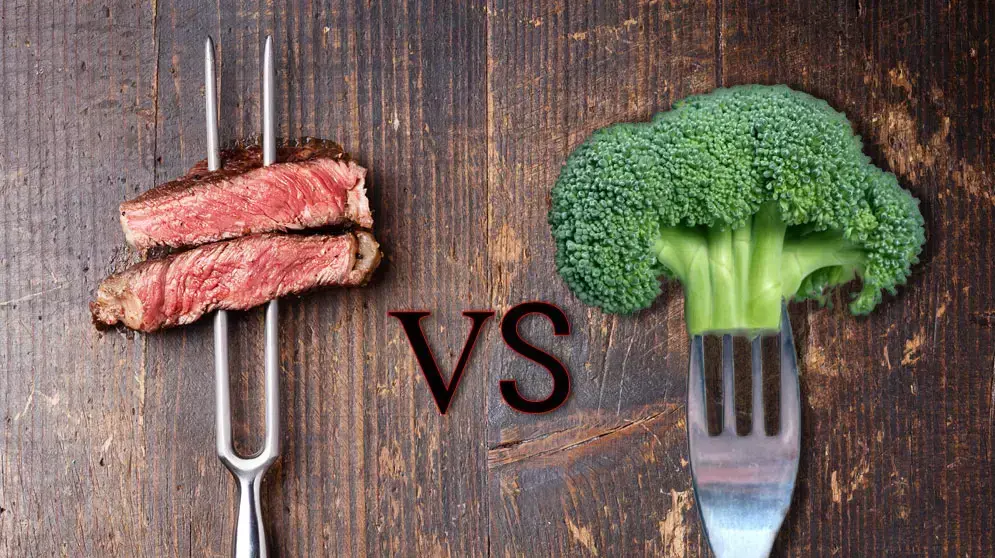Paleo vs. Vegan - Debate Conference/Photo: Ido Shaham Editing: Maya Ben Nissan
Recently there has been a flood of series dealing with nutrition and health matters.
The latest series on Netflix - "Man Is What He Eats: Twins and Twins" - reignited the debate about which diet is better.
This documentary series presents itself as a comprehensive investigation into the effects of vegan versus omnivorous diets, and is based on twin and identical twin research that allows for the control of genetic factors.
But does this research really offer valuable insights, or is it just another series designed to entertain and generate noise?
An article published by the famous doctor Dr. Peter Attia examined the subject in depth.
The study, which appeared in the series, recruited pairs of twins and identical twins who were randomly assigned so that one received a vegan diet while the other received an omnivorous diet for eight weeks.
Both groups underwent comprehensive monitoring of dietary adherence and measures of metabolic health throughout the study period.
The results indicated a decrease in LDL cholesterol levels and a decrease in body weight among the participants who ate a vegan diet compared to those who ate an omnivorous diet.
Veganism against Paleo/Ido Shaham
Despite the observed improvements, several limitations challenge the validity of the study.
First, participants reported lower satisfaction with the vegan diet, which raises concerns that in the longer term people will find it difficult to stick to this diet (the study only lasted 8 weeks).
In addition, the study did not isolate specific nutritional variables such as total calorie consumption and consumption of proteins, fats and essential carbohydrates for an accurate comparison between the study groups.
A fundamental flaw in the research that was carried out was that there was no control over key nutritional factors between the group of vegans and the group of omnivores.
It turns out that the calorie intake and the saturated fat intake were significantly different between the groups, with the vegan group unintentionally receiving a diet that was more limited in calories and with a lower amount of saturated fat.
This fundamental flaw calls into question all the conclusions of the study regarding the health benefits of the vegan diet, because it is not clear whether this is due to the vegan diet itself or simply from the calorie restriction.
Research based on an arbitrary division of diets into plant-based versus animal-based diets ignores the complexity that exists within these groups.
Mushrooms and yeast, for example, are closer to the animal kingdom than to the plant kingdom, so why are they allowed in the vegan diet?
And what about bacteria found in pickled vegetables or seaweed, both of which are not close to either the plant or animal kingdom?
The distinction between a plant-based diet and an animal-based diet is scientifically unfounded, since it ignores the varied nutritional profiles in each group.
Instead of focusing on the source of the food, the effects of different diets should be evaluated based on their chemical composition.
More in Walla!
KKL-Junk encourages climate studies through scholarships for young students
In collaboration with KKL-Junk
Entertainment or science?
While we have ruled out the scientific basis of the research published in the series, it should not be ignored that for certain people there can be a potential benefit to a plant-based diet.
Factors such as environmental influence, religious beliefs, and animal welfare may influence their choices beyond purely health considerations.
However, these motivations should not overshadow the need for rigorous scientific investigation of dietary interventions.
In conclusion, the documentary series that recently appeared on Netflix promoting plant-based diets does not provide reliable scientific evidence.
Despite the series study's attempt to control for genetic factors, its flawed design compromises its validity.
Unlike trying to divide diets into different types in a simplistic way like the one performed in the study in this series, future studies should be based on comprehensive dietary assessments to provide evidence-based dietary recommendations.
Ultimately, while entertainment has a place in our lives, it should not be mistaken for rigorous scientific research from which conclusions can be drawn.
Dr. Dalit Dariman Medina is an expert in family medicine and integrative and functional medicine
More on the same topic:
naturalism
diet

